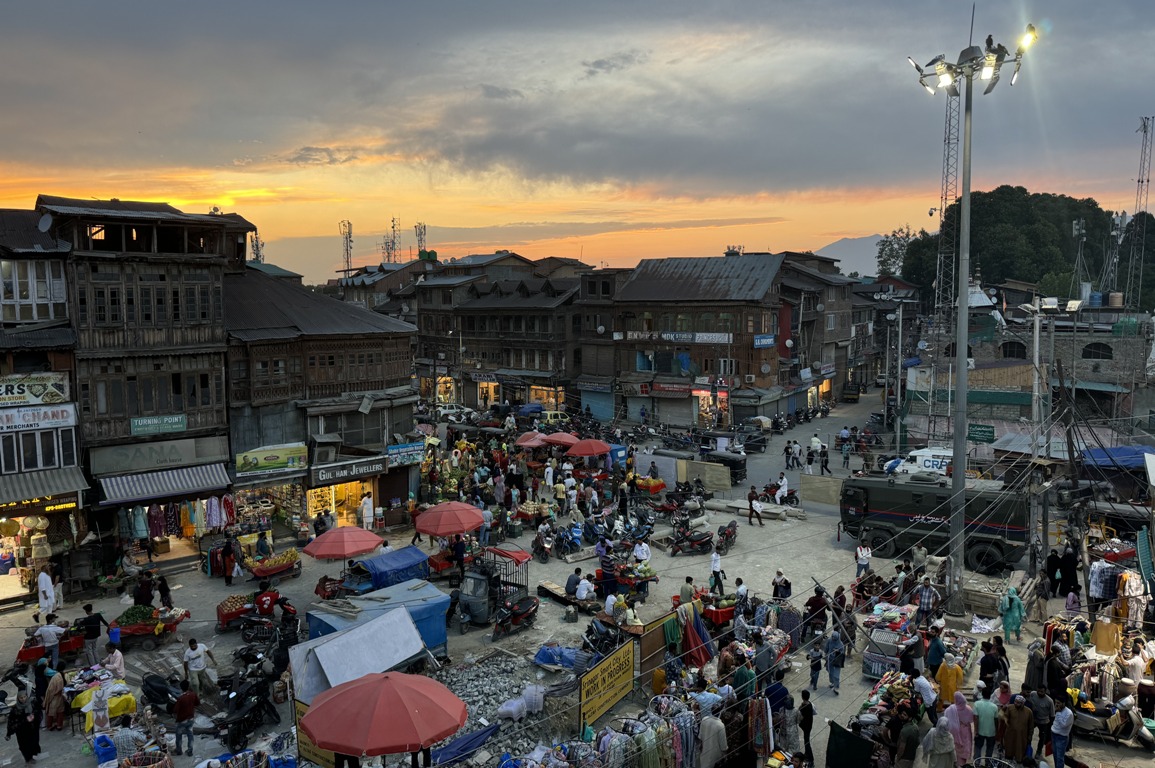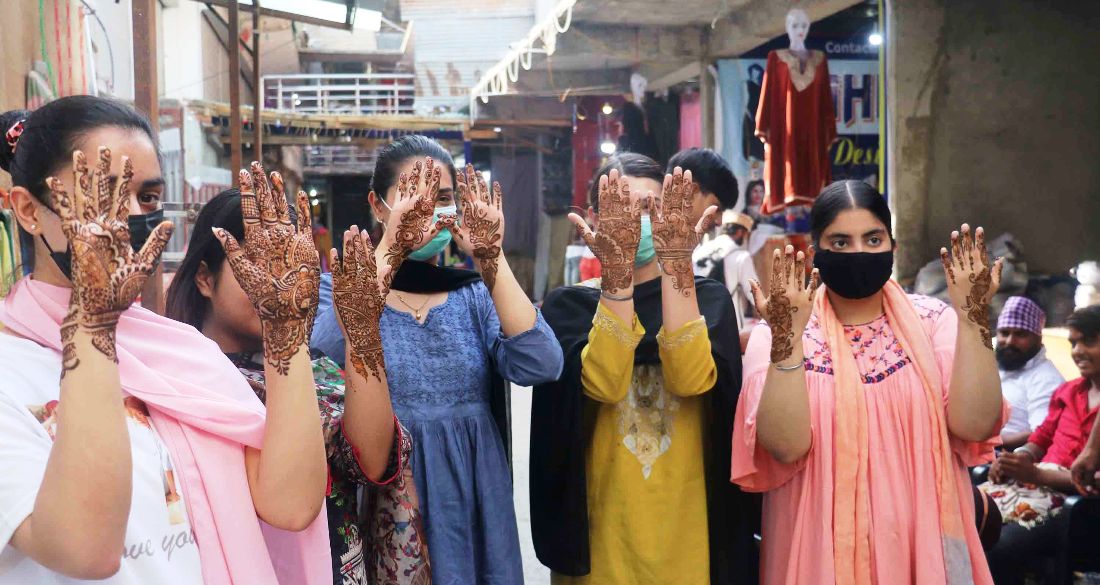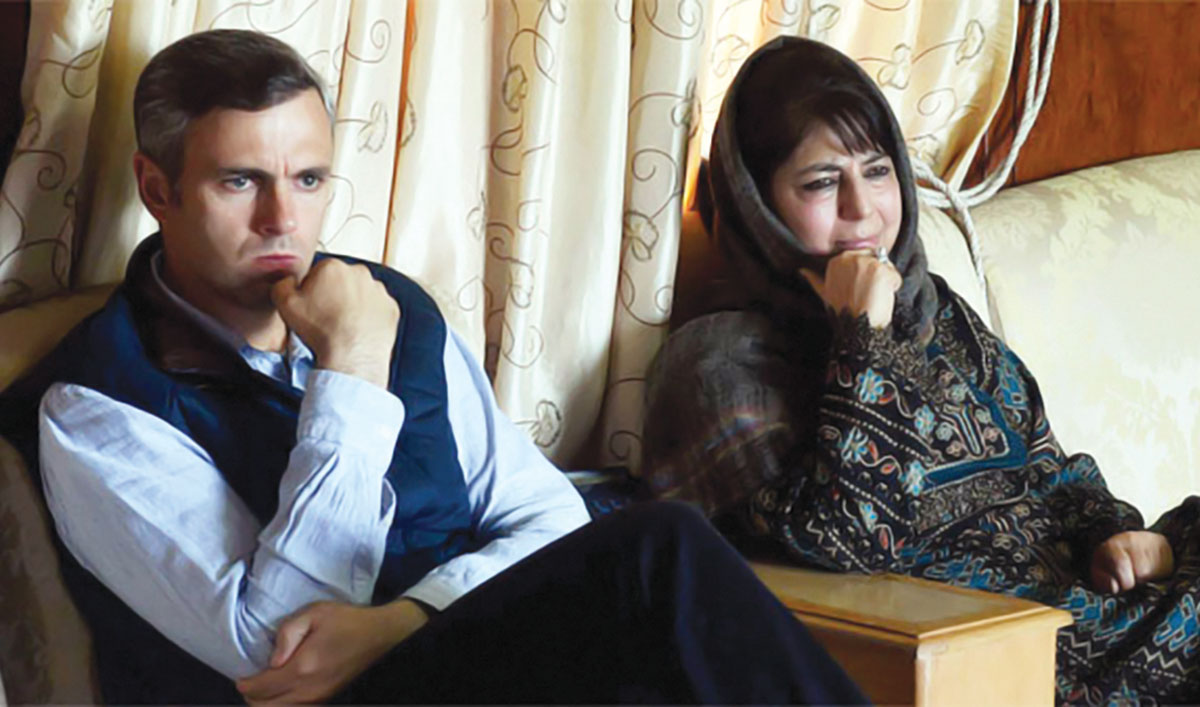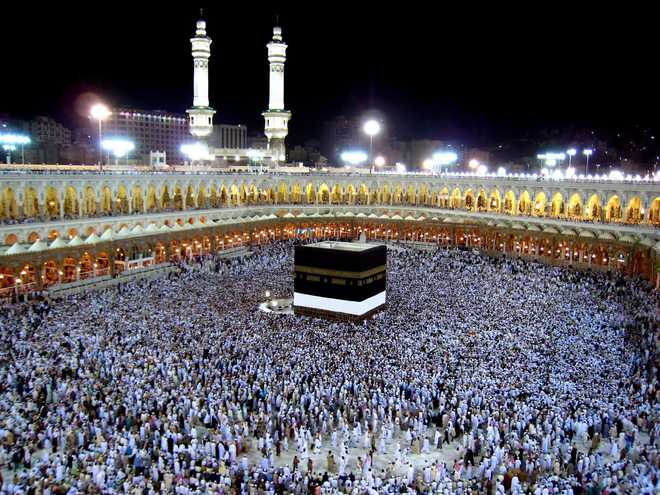On the eve of Eid 2024, Syed Shadab Ali Gillani and Babra Wani visited the key Srinagar markets and found them deserted. While the traders said the footfalls had evaporated, the shoppers talked about a fall in incomes that forced a new limitation on the families. This situation has made kids the kings of the market
A week before Eid-ul-Azha, Irfan and his wife with their two children visited the famous plea market, the Sunday Market to shop for their kids. “We shopped clothes for our kids there as we cannot afford to go to a high-end mall that sells expensive items,” Irfan said. “It is Eid and children are excited, we have to fulfil their wishes of having new dresses on the occasion.”
This couple had come from South Kashmir to shop for their two children, a son and a daughter, aged five and ten respectively. “You know how children are, and they need new things and also seeing that they go to play with other children. They may feel neglected if we do not buy them new clothes every Eid,” Irfan, a labourer, said.
One of two major Islamic festivals, Eid ul Azha is celebrated across the globe with great happiness. The markets become extra vibrant as people flock to the markets for shopping. The markets sunk during the pandemic and never revived. In the Kashmir case, many political interventions added to the mess.
Srinagar’s major bazaars like Goni Khan, Jamia Market, Maharaji Bazaar and Lal Chowk, are currently witnessing the least footfalls. In Lal Chowk, one finds more tourists clicking selfies near Ghanta Ghar than the residents shopping around.
“The market has been going only down for the last few years,” Sajad Ahmed, a shop owner in Nowhatta’s Jamia market said. “The customer flow used to be very good but for the last four years, the flow has become scarce. I guess people do not have as much money as they used to have.”
Sajad has run a baby clothing shop for the last decade. “I think the last year was way too better than this year,” he said. “We hardly have any customers now. There are days when till evenings I have no customers, and it is not just me every shopkeeper is facing the music.”
Recalling his fond memories regarding the Eid market, Sajad said: “People used to buy aprons, baby sets, socks, shoes, caps, and bibs for their children on Eid. And alhamdulilah we had a good customer influx but for the last few years, the customer flow has declined. People do not shop for anything extra now. Earlier, we used to be selling items for Eid fifteen days prior, but now hardly a week is left and we have almost zero customers.”
Sajad’s neighbour, an imitation jewellery seller of twenty years said that the customer flow has become a lot lesser this year, compared to all other years. “Last year Eid was better than this year and people used to shop for imitation jewellery. Little girls used to shop for rings and neckpieces, bangles but not anymore,” He said. “Since the COVID era, the market has become stark. We hardly have any customers. The flow of customers has become almost 80 per cent lower than what it used to be.”
All these shopkeepers believe that it is just the kid’s wearable items that are selling currently.

An Eid for Children
“There is no rush. All these people that you are seeing are all here to buy items for their kids,” Fayaz Ahmed, a shopkeeper of forty years, said. “People will do anything; take debts and credits to buy their children new clothes, because that is how parenting is. You forget about yourself and buy for your children.”
Fayaz thinks that the downfall of the market can be attributed to the Covid era. “Since 2020, there has only been a downfall in the market. For the past four years, everyone has witnessed a decline. There have been other factors as well that played their parts like the GST. Our markets were very jubilant in the past but now everything has changed.”
Fayaz has been running a dupatta shop for four decades. “The customer flow has reduced by ten per cent while the expenses have managed to crawl up 20 per cent. We are at a loss of 10 per cent right now. The income has become less, while the expenses have become more.”
Recalling his own experiences of the Eid market, he said, they would not have time to talk as the rush of customers would surge around Eid. “The hustle and bustle has been reduced to just ten per cent. And even these ten per cent of people are mostly shopping for their children.”
Explaining the reason behind the downfall, Fayaz said, “If you see a few years back shopkeeper did very well everyone earned their livelihood decently, however after COVID struck, people started having less money and then the marketplaces suffered too as there were no buyers. Even the last Eid was better than this one. This will only escalate with time.”
“The only things that are currently in demand and still selling are just children’s items be it clothes or toys or footwear for that matter. It is only their items that are still making it. Even the food items are not being sold as the practice was earlier. We have cheese sellers here, very famous for the cheese, in the past they used to have long lines of customers waiting for their turn to buy the cheese, but look at them now they do not have customers. The height is that we are selling items at a very low rate than the actual. People who come to us are not all customers, for example, if twenty people visit us only two will make a purchase. But in past, if we were visited by hundred people, 99 per cent of them used to shop.”
Just a few shops ahead of Fayaz is an old man selling footwear. He wanted to stay anonymous. “Eid che aasaan bacchan (eid is for children),” he said, “For elders, there are expenses and how to manage them.”
He stated that during both the Eids, it was the kids’ footwear that sold for him, “seldom will any customer come to buy for himself or herself,” he said while catering to a woman who was there to shop for her child. “The market is down overall but we should be grateful in every situation as a Muslim. Even though the workload has reduced tenfold.”
This elder trader asserted that the reason behind the downfall was that the financial situation of the people had worsened. “They only buy for their children. As children’s hearts are too fragile, they want new things. You cannot make them understand, they are children. They associate Eid with new things.”
Most of the shopkeepers echoed the sentiment. “Eid is mainly for children. They buy firecrackers, dresses, footwear, new toys and become happy,” a toy shop owner in Lal Chowk said. “Children wait for these two occasions. Even though the flow is no longer the same as it used to be even for us I cannot get started about the rest of the shopkeepers.”
Even the bakery shops are taking orders for children-themed pastry items. “We have orders for cakes designed especially for the children like kinder joy themed, or like Barbie themed cakes. We keep receiving such orders like every year when the confectionary items are mostly made according to the orders,” a bakery shop owner of thirty years stated. “Everything is for children. Our customers tell us that the special orders should be pleasing to the eyes of the children.”
Another bakery owner stated that they bake special cupcakes, cream rolls and pastries for children, “After all Eid is for children. We should fulfil their demands.”
A kid’s wear shopkeeper stated that his shop is doing well compared to his neighbouring shops, “I am still selling two to three pieces while these other shops are having trouble in even doing that.”
The Key Markets
In Goni Khan and Maharaji Bazaar markets which are the hub of everything needed the situation is no different from other market shops. “The market is very low. Earlier the rush was still fine during the Eid ul Fitr but this time it is different and very low,” Shakeel Ahmed, a shop owner in Goni Khan said. “There are several reasons like financial constraints and the current construction that is going on in these places like Goni Khan and Maharaji Bazaar. People are not coming anymore because there are no parking spaces, no roads to drive your two-wheelers nothing. So people have stopped shopping here.”
Another shopkeeper in the same area said that his shop is doing well. “Different shopkeepers will have different opinions but the fact of the matter is that we are doing better than others. Especially during the Eid period, the customer flow is good.”

For Sudheer, a mehandi artist who has been staying in Goni Khan for the last fifteen years, the market this year is very shallow. “We have no customers right now,” he said. “By Eid, we used to have girls and women coming to us to apply mehandi but now there is nobody.” Sudheer and his friends have retorted to sell mehandi comes during Eid. “This mehandi is from Rajasthan. We sell a cone for Rs 20.”
Shopper’s Dilemma
Not just shopkeepers but shoppers are facing the music too. While shopkeepers are trying their best to attract customers, shoppers are also trying their best to avoid any unnecessary shopping.
“We came to Sunday market to shop for our children because they have reasonable rates here, while the shops in our place are very expensive and it is beyond our capacity,” Irfan stated, “We bought a pair of jeans and shirts for our son and a frock for our daughter. We are set. We have to manage the bakery and other edibles as well after this.”
Another man from Kulgam, Yasir just managed to shop for his children. “I did not get anything for myself or for my wife I just thought maybe shopping for my babies would be enough. We can manage by wearing the clothes we already have. But the market rates are too high to be very honest. The markets are burning and then there is the unpredictable temperature.”
“I find online shopping more convenient than the offline one,” Saba, a resident of Srinagar said, “I think since 2018 I have not shopped offline. I go to online stores and shop from there hassle-free.”
Another ardent shopper, who has always shopped overwhelmingly on Eid’s stated that the markets these days lack variety. “If we see and compare the quality of the stuff from previous Eid’s, the stuff has been compromised as well. My heart does not even want to go to any shop or market.”
The Online Stores
Just like Saba, Basirah also chose online shopping compared to traditional shopping. “I think online we find more verities and styles of dresses plus it reaches us like at our doorstep and it is always very convenient for us,” She said. “Our own people have now started their own online stores where they sell Kashmir-made dresses at very reasonable prices. So I always prefer those.”
Dr Sheikh Hafsa who owns an online clothing store, The Saffron Wardrobe stated that her business is doing very well. “I receive a lot of orders, especially during Eid and for the convenience of our customers we also have introduced a day hassle for delivery. Alhamdulillah my stores are doing well.”
“Eid is all about clothes, food and confectionery for us,” another online store owner Syed Sana, who recently started her online store said. “These things are booming but for me, it’s just I’m not able to make a mark right now in the market! Maybe, the page is new, not known to many people and my followers are less as compared to other pages. So, it will take time to gear up, but still, we are doing well.”
An online company Studio by Adore conducted a three-day Eid festival in a hotel in Jawahar Nagar where 37 different stalls are showcasing their ventures. Hafsa and her sister had their stalls in the fest too. “Alhamdulillah it was going very well. We made a lot of sales.”
These different stalls sell different types of attires, kids-wear, food items, makeup, bakery and confectionery items. “The flow of people coming and shopping at the fest was huge. Especially the kids-wear was selling very well,” a shopper who attended the festival said.
The Sacrificial Market
Unlike the choti Eid, the baddi Eid is not just about dresses and food items. The biggest significance of this Eid is the sacrifice that Muslims all over the globe make, hence the name bakra Eid. In Kashmir, the biggest sacrificial market can be found in Eidgah, where sacrificial animals are sold every day.
MehrajUd Din, General Secretary of Mutton Dealers Association Kashmir said this season they have a variety of high-quality breeds from outside Jammu and Kashmir including Rajasthani, Marwadi, Kaju Walla, Jasalmeeri among others. “Currently, these out-of-state varieties are known for providing the best quality meat for buyers.”
On average, he said, 50 to 60 trucks laden with sheep arrive in Kashmir every day. The supply from outside the state remains high and will last up to two days before Eid.
However, both the sheep sellers and buyers are facing their own sets of challenges. “In past, I used to come with around ten sheep to sell them here, and usually within two days I would finish my work,” Manzoor Ahmed, a local breeder of the last 10 years, said. “But today I have only four sheep for selling and it has already been three days that I have been here but I failed to make even a single sale. Even if customers come, they upon hearing the rate go away. They do not even stop for bargaining.” Similar sentiments were echoed by Mohammad Rafiq, who had come to buy a sacrificial animal. “The rates are too high. I cannot afford to buy an animal because I literally save money for making qurbaani, but the rates these days are out of my budget. I think I should go to some other place to make the purchase.”
Business Leaders Speak
Mohammad Yaseen Khan, President Kashmir Traders and Manufacturers Federation (KTMF) acknowledged the low business activity across Kashmir. He stated that there was no major shift in the market between this Eid and last year’s Eid. “This Eid is mainly about Qurbaani and there used to be the huge rush in markets eight to ten days before Eid for the purchase of animals for sacrifice but there is a market decline and people are less enthusiastic this time.”
Yaseen went on to say that, despite Kashmir’s thriving tourism business, markets do not exhibit a shift. Khan mentioned the outstanding loans from financial institutions. “Since 2019, we have been unable to pay our EMIs on time,” He said. “We currently owe these institutions a huge amount, and it is increasing day after day, which is adding to the market fall, in addition to inflation. The truth is that people do not have enough money, so every sector suffers.”
There are a few sectors like electronics, readymade garments, footwear, food etc which always looked forward to days like Eid because they were always hopeful of huge profits but the current scenario suggests that these sectors are the worst affected.
“We used to do better on Eid. I can say that the last Eid was very bad, but this Eid is worse,” Shah Adnan, Secretary General Chamber of Commerce and Industries, Kashmir (CCIK). “Day by day, it is going bad. It is on a decline. But as a businessman, I would say when there were lockdowns; I used to work only four days a week. In those four days, I used to earn more money than I earn today. In the lockdowns, if I would have kept my shop open only for four or five days, my revenue would be more than what it is right now.”
Adnan asserted that the government should not have tourism as its focus. “Even though tourism is a very important factor and the government is doing well in regards to the sector. But they should think about the general trade as well. The general trade situation is very bad,” Adnan said. “If I talk about my 28 outlets or as a Secretary General of Chamber of Commerce, when I talk to people, in general trade, whether it is your FMCG products, or your daily wear apparels, or whatever, it is on a decline. And right now, the situation is not that bad. I am sure after Eid, you will see a lot of small, small entrepreneurs winding up their business and looking for jobs.”
Asserting that the decline started much before COVID-19. It actually started with demonetisation. Adnan explained that the kids’ wear is selling. “Our prime focus on Eid, is kids wear only. Kid’s wear sells more. But even it has gone down in comparison,” he said. “Earlier, parents used to take multiple dresses for kids now they they hardly take one set.”
Adnan who also organises Eid festivals said he is providing a real platform to the young entrepreneurs who operate virtually. “We want to give them, exposure to, one, with the customer, face to face dealing. Now, what happens is, when we give them exposure, give them stalls, when we give them these stalls, then here, they have direct communication, with the customer, and within no time, one of their deals is done, like, a customer comes, he or she sees an item, they make the deal.”
Asserting that the online might be an in-thing but the real market is equally important. Adnan lamented that the introduction of online platforms like Myntra, Amazon, and Flipkart has affected traditional marketing. “However, we cannot just sit and complain. We have to change with the changing times too. We have to evolve, we can set up an online portal for our stores too.”













